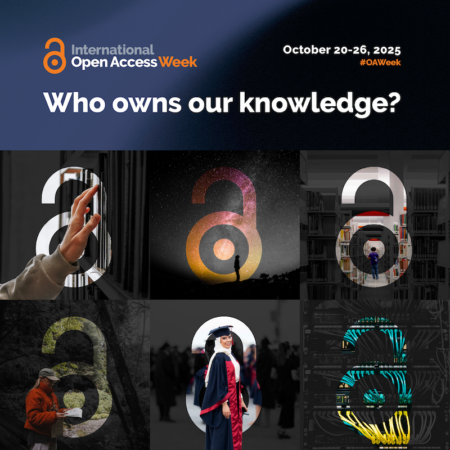Who Owns Our Knowledge? Open Access Week 2025 at JMU
Posted October 2, 2025 in Uncategorized

Scholarly work and research created at JMU advances the public good and the global academic community. However, getting new knowledge into the hands of scholars, policymakers, students, and the public is often harder than it should be. Too often, commercial interests overshadow the value of open sharing of knowledge, resulting in subscription fees, paywalls, and publishing models that restrict access to the very knowledge meant to benefit society.
This concern was recognized in the 2021 UNESCO Recommendation on Open Science, which called for action to “prevent…. [the] inequitable extraction of profit from publicly funded scientific activities” (p. 22).
This year’s International Open Access Week (October 20-26) invites us to reflect on the question: “Who owns our knowledge?” It’s not just about who can access information, research, and education, but also about how and where knowledge is shared, whose voices are heard, and who benefits from sharing or accessing knowledge.
What is Open Access?
Open Access (OA) is the practice of making research and scholarship freely available online. Journals, books, databases, and other materials can be made open access, expanding the reach of scholarship.
Why Open Access Matters at JMU
At JMU Libraries, we believe access to reliable, peer-reviewed information is essential. Prioritizing OA can help foster a more ethical, equitable scholarly ecosystem—one where students, researchers, and the public can benefit from knowledge without financial barriers.
5 Things You Can Do For OA Week
In honor of Open Access Week—and in support of reclaiming community ownership of knowledge—we invite you to:
1. Attend OA Week Events: Consider attending our Panel Presentation: Publishing an Open Access Journal with JMU Libraries (Tuesday 10/21 at 2 p.m. on Zoom or in Rose). Soon, we’ll add a link here to share online events from other universities!
2. Learn About OA: Explore our resources and engage with open scholarship.
3. Retain your copyright: Don’t automatically sign it away. Negotiate with publishers to retain your copyright or publish in OA venues.
4. Assign Open Textbooks: Lower student costs and customize materials with high-quality open and affordable course content.
5. Publish Open Access: Share your work more widely, increase its impact, and boost citation rates.
How JMU Libraries Can Help You Publish OA
We’re committed to supporting JMU faculty, staff, and students in making their work as openly available as possible.
- Journals: Our publisher agreements can cover or reduce OA publishing costs with major publishers like Wiley, ACM, ACS, MDPI, and Springer. If you want to publish an OA article in a journal with which we don’t have a publisher agreement, we offer a limited Open Access APC Fund for JMU authors. Our APC fund is provided in partnership with JMU’s Research, Economic Development and Innovation (REDI) division, while our publisher agreements are thanks to our participation in VIVA and other memberships.
- Books: Some OA book publishers don’t charge authors to make their work open access. You can also publish your own e-book using Pressbooks, a tool we provide for creating online books and interactive course materials.
- Online: Share articles, conference presentations, and more through JMU Scholarly Commons, our institutional repository, which has surpassed 1 million downloads per year, connecting JMU scholarship to a global audience.
At JMU Libraries, we’re here to support you through every step of your OA journey. Learn more on our Open Access page or contact Yasmeen Shorish, Director of Data & Scholarly Communications.